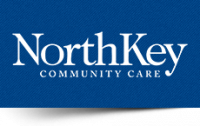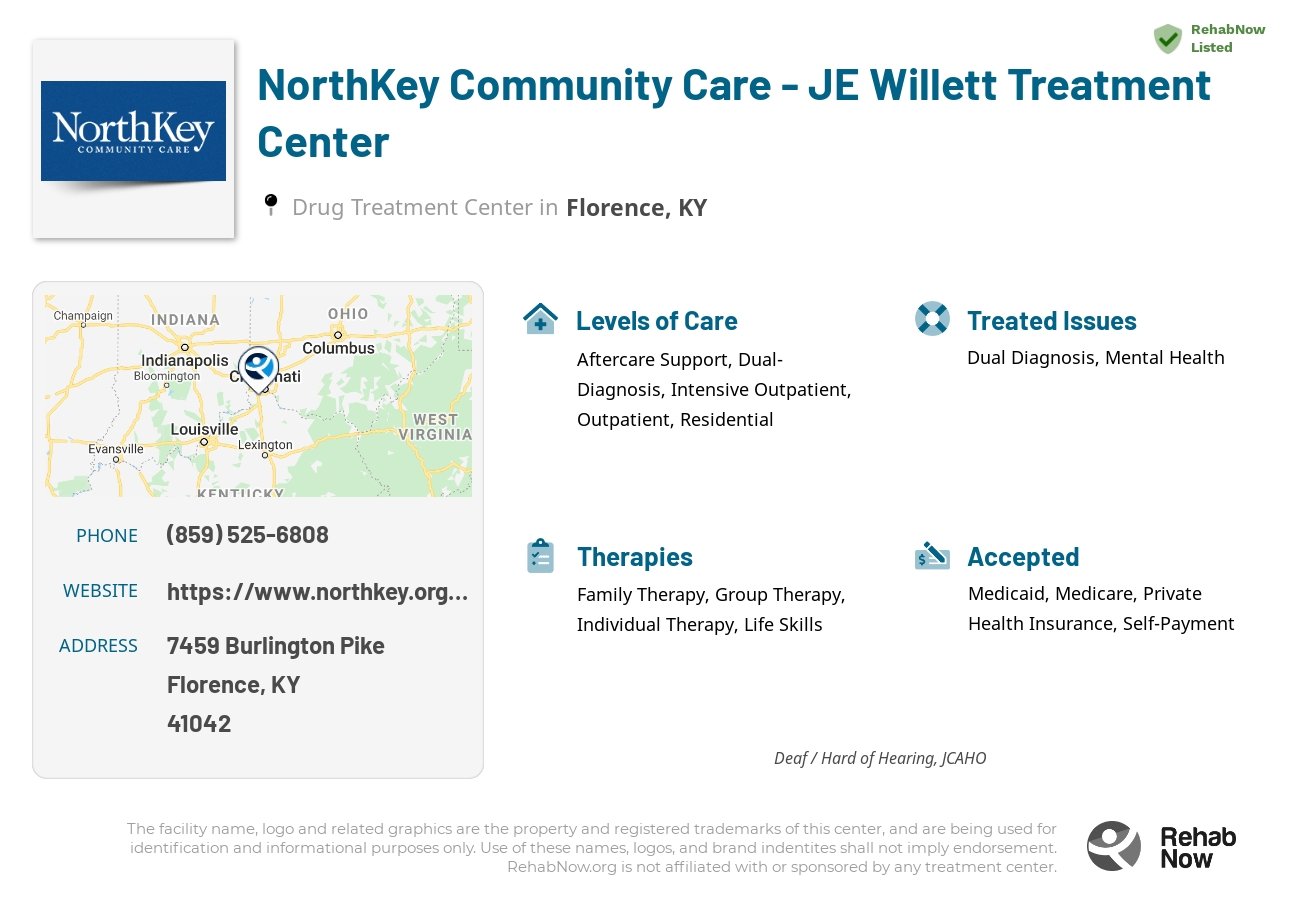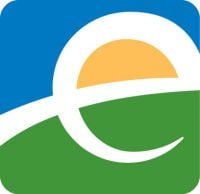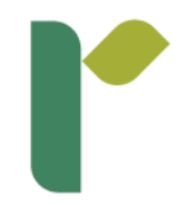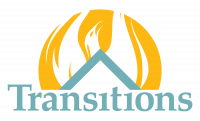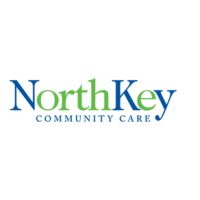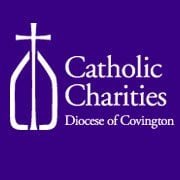NorthKey Community Care - JE Willett Treatment Center
Drug Rehab Center in Florence, Kentucky
JE Willett Treatment Center offers accredited addiction and substance abuse services, including detoxification, counseling, recovery support, and evidence-based treatment programs, delivered by a professional team with over 25 years of quality care experience.
About NorthKey Community Care - JE Willett Treatment Center in Kentucky
NorthKey Community Care - JE Willett Treatment Center, founded in 1966, is an addiction treatment facility located in Florence, Kentucky. As an accredited facility by JCAHO, they are committed to providing high-quality care to individuals suffering from addiction and mental health disorders. Their comprehensive approach focuses on dual diagnosis treatment, ensuring that individuals receive the necessary support for both their addiction and mental health needs. With a range of treatment options available, including aftercare support, dual-diagnosis treatment, intensive outpatient, outpatient, and residential levels of care, NorthKey Community Care - JE Willett Treatment Center aims to meet the diverse needs of their clients.
At NorthKey Community Care - JE Willett Treatment Center, individuals struggling with addiction can expect a wide range of services to help them on their journey to recovery. Their aftercare support programs provide continued guidance and assistance to individuals after completing their primary treatment, ensuring a smooth transition back into their everyday lives. The center also offers dual-diagnosis treatment, recognizing the link between substance abuse and mental health disorders, and providing specialized care to address both issues simultaneously. Additionally, they provide intensive outpatient and outpatient programs, allowing individuals to receive treatment while maintaining their daily responsibilities. For those in need of a more immersive treatment experience, residential levels of care are available, providing a structured and supportive environment for individuals to focus on their recovery. Overall, NorthKey Community Care - JE Willett Treatment Center offers a range of services tailored to meet the unique needs of each individual seeking help for addiction and substance abuse.
Genders
Ages
Modality
Additional
Accreditations

JCAHO
Conditions and Issues Treated
Dual Diagnosis therapy is considered more successful than traditional rehab methods because it treats the addiction and the underlying mental health disorder simultaneously. This comprehensive approach gives Florence, KY patients the best chance for long-term recovery. If the patient does not receive treatment for both conditions, they are more likely to relapse.
Levels of Care Offered
This center offers a variety of custom treatment tailored to individual recovery. Currently available are Aftercare Support, Dual-Diagnosis, Intensive Outpatient, Outpatient, Residential, with additional therapies available as listed below.
An intensive outpatient treatment program, or IOP, is set up for those struggling with an addiction to begin the recovery process. However, the patient will not live at the facility during treatment.
IOP involves patients coming in and out of a medical office building regularly to receive therapy and other services while continuing their life outside of these visits.
IOP is a step up from drug detoxification or alcohol detox. However, it’s still considered a phase of recovery rather than the ultimate goal. There are many rehabs and treatment facilities available to patients in need of IOP.
Outpatient treatment consists of counseling and therapy sessions. The outpatient treatment process begins with the addict’s initial detox period, lasting about ten days. Outpatient treatment is used for those who are at moderate risk for “slipping back” into the addiction. It is also used for those who are not currently experiencing any side effects from withdrawal, can handle social pressure, have a stable living environment, and have a good support system.
Residential treatment programs are those that offer housing and meals in addition to substance abuse treatment. Rehab facilities that offer residential treatment allow patients to focus solely on recovery, in an environment totally separate from their lives. Some rehab centers specialize in short-term residential treatment (a few days to a week or two), while others solely provide treatment on a long-term basis (several weeks to months). Some offer both, and tailor treatment to the patient’s individual requirements.
Aftercare support is often overlooked in the treatment of drug and alcohol addiction. However, it’s an essential part and should be considered when planning a course of rehab.
Aftercare is a term that’s used to refer to any sort of continuing care offered for a drug addict who has voluntarily entered a rehabilitation program. This type of care can be provided in several settings, including outpatient therapy sessions after the addict has completed an inpatient program. There are also 12-step support groups, such as Alcoholics Anonymous, which can provide additional help for addicts trying to stay sober.
Aftercare is vital because addicts often face many challenges as they attempt to recover from drug addiction or alcoholism. Because of the powerful nature of these addictions, those who struggle with a drug or alcohol problem will likely have to face the craving for their substance of choice for the rest of their lives. Recovering can be a lonely and frustrating endeavor, especially without the support of others who are going through similar situations.
Therapies & Programs
Individual Therapy is a crucial component of addiction recovery. Therapists work with patients to identify the root of their addiction and figure out how to better handle the issues that led to them using drugs. Individual Therapy is one on one sessions where people meet with their therapist. Individual therapy provides a safe space for people to open up and discuss personal and sensitive topics which they may not feel comfortable discussing in a group setting.
In this type of therapy, therapists can develop specific solutions for each patient, which helps speed up their recovery process. In addiction recovery, therapy is a crucial part. It allows patients to go deep into their core issues and discover how those problems can be better handled now. Therapy can be performed in individual sessions as well as group settings. In individual therapy for addiction, the patient meets with the therapist one-on-one to focus on the underlying issues of addiction and come up with solutions to prevent future abuse.
Family therapy is a crucial part of drug treatment and getting sober. It is one of the most effective ways to help addicts stay on the path to long-term sobriety. One of the most important parts of family therapy is the relapse prevention plan. During treatment, therapists and doctors will often sit down with the addict and their family to develop a plan if the addict ever feels like they want to use again. This plan should involve steps the addict and family can take together to prevent them from relapsing in the future.
An addict’s family can play a vital part in helping them to avoid relapse because they can spot the warning signs and help them get back on track before it becomes too much of a problem. Family therapy is one of the most effective ways to help addicts stay on the path to long-term sobriety.
Group Therapy is employed by drug treatment centers like NorthKey Community Care - JE Willett Treatment Center to provide the recovering addict with a platform to talk about their feelings and experiences. It also provides for an opportunity to learn from other addicts who have successfully overcome their addiction. It is recommended that all group members be recovering addicts for this type of therapy to work.
Life Skills Services provide services aimed at helping people enter into and maintain long-term sobriety. The services are offered at varying levels of intensity, specific to the needs and requirements of each patient. Some benefits of these services are restoring hope and empowerment, enhancing family involvement, increasing patient compliance, and reducing relapse rates.
Training someone on improved life skills allows someone recovering from an addiction to feel more capable of taking care of him or herself. The skills taught in NorthKey Community Care - JE Willett Treatment Center are daily skills that give a better recovery foundation by simply giving the person tools they need to survive.
Payment Options Accepted
For specific insurance or payment methods please contact us.
Is your insurance accepted?
Ask an expert, call (888) 674-0062
NorthKey Community Care Associated Centers
Discover treatment facilities under the same provider.
- NorthKey Community Care - Owenton in Owenton, KY
- NorthKey Community Care - Madison Avenue in Covington, KY
- NorthKey Community Care - East 5th Street in Newport, KY
- NorthKey Community Care - Warsaw in Warsaw, KY
- NorthKey Community Care - Falmouth Outpatient in Falmouth, KY
Learn More About NorthKey Community Care Centers
Additional Details
Specifics, location, and helpful extra information.
Florence, Kentucky 41042 Phone Number(859) 525-6808 Meta DetailsUpdated November 25, 2023
Staff Verified
NorthKey Community Care - JE Willett Treatment Center Patient Reviews
There are no reviews yet. Be the first one to write one.
Florence, Kentucky Addiction Information
Kentucky ranks among the top ten states for opioid-related overdoses. Most of these are due to heroin, fentanyl, and prescription opioid use. A little over 11% of the Kentucky population abuses alcohol in a given year. More than 15% of Kentucky adults admit to participating in binge drinking every month.
2 out of every 15 teenagers in Florence are struggling with alcoholism. 8% of residents are addicted to at least one substance, including alcohol and weed. About 300 people in the region inject drugs like heroin and meth on a regular basis. 100 people die annually from a drug overdose in the area. Drug treatment centers in Florence offer specialized procedures to help people overcome their addiction to drugs and alcohol.
Treatment in Nearby Cities
- Mount Vernon, KY (115.1 mi.)
- Buckhorn, KY (130.5 mi.)
- Morehead, KY (86.2 mi.)
- Warsaw, KY (20.7 mi.)
- Russellville, KY (193.1 mi.)
Centers near NorthKey Community Care - JE Willett Treatment Center
The facility name, logo and brand are the property and registered trademarks of NorthKey Community Care - JE Willett Treatment Center, and are being used for identification and informational purposes only. Use of these names, logos and brands shall not imply endorsement. RehabNow.org is not affiliated with or sponsored by NorthKey Community Care - JE Willett Treatment Center.
